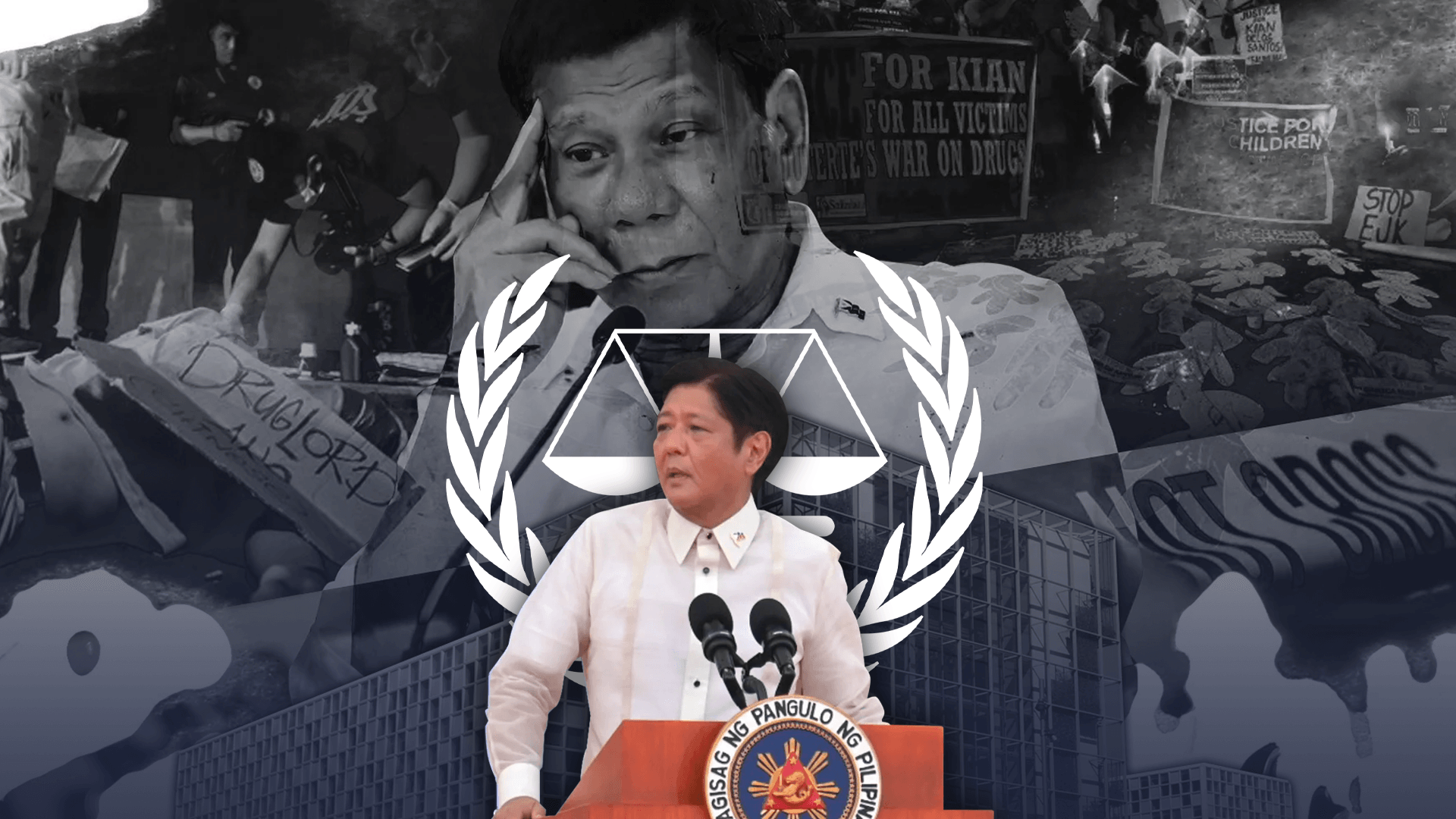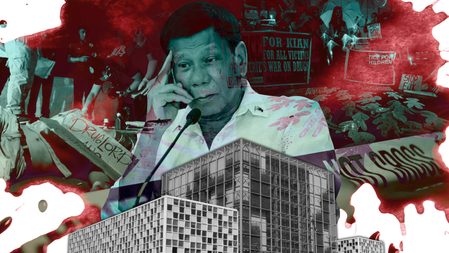SUMMARY
This is AI generated summarization, which may have errors. For context, always refer to the full article.

MANILA, Philippines – President Ferdinand Marcos Jr. said that the Philippines will not be joining the International Criminal Court (ICC), but his decision will not stop the ongoing proceedings against killings under former president Rodrigo Duterte’s violent war on drugs.
“The Philippines has no intention of rejoining the ICC,” he said during a chance interview with reporters on Monday, August 1.
The country ceased being a member-state of the ICC on March 17, 2019, a year since Duterte announced his decision to withdraw after then-ICC prosecutor Fatou Bensouda initiated a preliminary examination into incidents that happened during the brutal war on drugs.
Data from the government shows that at least 6,252 people were killed during police anti-illegal drug operations from July 1, 2016 to May 31, 2022, but this tally does not include victims of vigilante-style killings, which, according to human rights groups, would pull up the number of deaths to around 30,000.
Documents obtained by Rappler, however, show that police already recorded 7,884 deaths between July 1, 2016 to August 31, 2020.
Continued non-membership will not affect ongoing probe
The Philippines’ withdrawal – and Marcos’ decision not to rejoin – will not affect the ongoing ICC proceedings. Article 127 of the Rome Statute, the founding document of the court, explicitly states that criminal investigations and proceedings that started before the withdrawal came into effect will still continue.
ICC Prosecutor Karim Khan is investigating the drug war killings during Duterte’s presidency, from July 2016 to March 16, 2019, as well as incidents that occurred in Davao City between 2011 and 2016, when Duterte was either mayor or vice mayor.
But what a withdrawal can do is make it difficult to exact cooperation in the conduct of the probe, Priya Pillai, an international lawyer with expertise in international justice and human rights told Rappler in 2019.
Marcos’ announcement comes days after he met his legal team on July 27 to discuss the government’s strategy regarding the international court, following Khan’s recent move to resume his probe after determining that there have been no genuine investigations at the domestic level.
The Philippines is invited, but not required, to submit a comment by September 8. According to Marcos, during the meeting, they discussed whether or not they would respond.
“Sinasabi naman namin eh may imbestigasyon naman dito at patuloy rin naman ang imbestigasyon, bakit magkakaroon ng ganoon?” Marcos said.
(We’re saying we already have investigations here and those are ongoing, so why should they have to investigate?)
No genuine investigations
But ICC’s Khan already pointed out in his information that the government failed to show that any individual has been probed “for ordering, planning, or instigating” the killings. He also said there has been no indication that “domestic authorities are investigating the alleged systematic nature of these and other killings.”
Khan also noted that the inter-agency drug war review panel conducted what appears to be a mere “desk review” that, “by itself, does not constitute investigative activity.” The panel was led by the Department of Justice, then-headed by Menardo Guevarra who is now Marcos’ solicitor general.
This decision by Marcos not to rejoin the ICC is consistent with his earlier pronouncement during the campaign season, when he said he would not help investigators. It also aligns with his general silence on human rights violations committed under the past administration. (READ: What Marcos excluded from SONA: Human rights, justice, peace)
While this is not surprising, rights group In Defense of Human Rights and Dignity (iDEFEND) said this will not “deter the push for justice for the victims of serious human rights violations especially as they don’t control the judges of the ICC.”
“Relatives’ support groups continue to engage the court towards pursuing the investigation of willful killings under the war on drugs. We will continue to fight for justice and accountability,” the group said. – Rappler.com
Add a comment
How does this make you feel?



![[The Slingshot] Lito Patay’s 4 hours and 38 minutes of infamy](https://www.rappler.com/tachyon/2024/07/Lito-Patay-4-hours-infamy-July-19-2024.jpg?resize=257%2C257&crop=233px%2C0px%2C720px%2C720px)

![[The Slingshot] A Duterte and Bato cop named Patay](https://www.rappler.com/tachyon/2024/06/tl-lito-patay.jpg?resize=257%2C257&crop=322px%2C0px%2C720px%2C720px)
![[In This Economy] Marcos’ POGO ban is popular, but will it work?](https://www.rappler.com/tachyon/2024/07/thought-leaders-marcos-pogo-ban.jpg?resize=257%2C257&crop=255px%2C0px%2C720px%2C720px)
![[Rappler Investigates] POGOs no-go as Typhoon Carina exits](https://www.rappler.com/tachyon/2024/07/newsletter-graphics-carina-pogo.jpg?resize=257%2C257&crop=424px%2C0px%2C1080px%2C1080px)





![[Just Saying] SONA 2024: Some disturbing points](https://www.rappler.com/tachyon/2024/07/TL-marcos-sona-points-july-23-2024.jpg?resize=257%2C257&crop=335px%2C0px%2C720px%2C720px)

![[OPINION] Rodrigo Duterte and his ‘unconditional love’ for China](https://www.rappler.com/tachyon/2024/04/rodrigo-duterte-xi-jinping-august-2019.jpeg?resize=257%2C257&crop=91px%2C0px%2C900px%2C900px)





There are no comments yet. Add your comment to start the conversation.